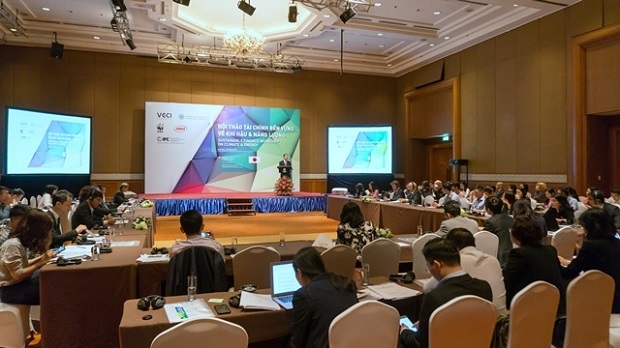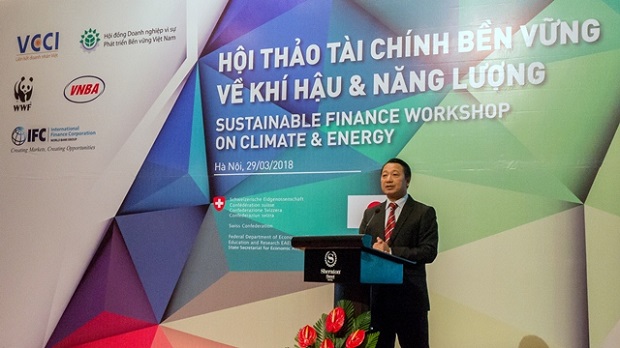Financial sector helps boost transition for low-carbon economy
Viet Nam’s financial sector needs to play a key role in the transitional efforts to develop a low-carbon, climate-resilient, economy through re-orienting investment to more sustainable projects, while accounting for environmental and social risks, experts have suggested.
 |
| The event features discussions on the opportunities and challenges associated with sustainable development. (Photo: Nhan Dan Online) |
Financial and environmental experts gathered at an international workshop on the theme of ‘Sustainable Finance on Climate and Energy’, which opened in Ha Noi on 29 March, to discuss measures to boost the financial sector’s activities in promoting Viet Nam’s tangible results on environmental and sustainable policy goals.
The event was jointly held by the Viet Nam Chamber of Commerce and Industry (VCCI), the Viet Nam Banking Association, the International Finance Corporation (IFC), and the world’s leading conservation organisation, World Wildlife Fund (WWF) in Viet Nam.
According to experts, climate change will have a profound impact on humans and eco-systems during the coming decades with adverse effects on the economy, cultures and livelihoods. The situation is particularly alarming for Viet Nam. Extreme weather and snow in the north, with drought and salinity intrusion in the South Central and Mekong Delta regions, has seriously affected production and the daily activities of millions of people.
Undeterred by such challenges, more than 180 countries gathered in Paris, France, to sign a landmark climate agreement to keep global temperature increases to well below 2 degrees Celsius, reaffirming the world’s commitment to cut greenhouse gas (GHG) emissions. With domestic resources, Viet Nam has pledged to reduce GHG emissions by 8% by 2030. This contribution could be increased to 25% with international support.
The aforementioned goal requires an increasingly critical role of the financial sector in managing climate-related risks and supporting the transition to a low-carbon economy. Its contribution is expected to be an important instrument to Viet Nam’s accomplishment of commitments to the Paris Agreement, as well as the UN’s Sustainable Development Goals.
VCCI Secretary General Nguyen Quang Vinh said that Viet Nam and its neighbouring countries will find the goals pledged during the ratification of the Paris Agreement unattainable if the financial sector fails to fulfill its duty. It is imperative that banks begin adopting a dismissive attitude towards investment projects that pose an inherent risk towards the environment and society. Only then, can the nation start working towards a sustainable economy, he stated.
 |
| VCCI Secretary General Nguyen Quang Vinh states that a dismissive attitude from financial institutions towards investment projects poses inherent risks towards the environment and that society helps to boost a sustainable economy. (Photo: Nhan Dan Online) |
Naomin Tan, Sustainable Finance Engagement Manager of WWF-Singapore, agreed that the financial sector plays a pivotal role in the transition to a low-carbon economy by shifting capital away from unsustainable activities. Particularly in developing countries like Viet Nam, financial institutions such as banks hold the key to turbo-charging sustainable development through the adoption of more stringent Environmental Social and Governance policies and by allocating capital to sustainable activities.
With 25 years of implementing sustainable development, including nearly six years of delivering the Viet Nam Green Growth Strategy, Viet Nam has been taking advantage of an established foundation for low carbon development. During the same period, the financial sector has made great strides in term of policies to measure up to global standards. This was exemplified by the IFC partnership with the State Bank of Viet Nam in which an environmental and social risk assessment handbook across ten sectors was drafted.
Viet Nam has implemented policies for delivering the Sustainable Development Goals. However, the lack of policy enforcement remains a key challenge, Naomin Tan said, adding that in the near future, WWF will collaborate with local banks, regulators and associations to promote sustainable finance though capacity building and the development of tools and guidelines.
At the event, leading financial and environmental experts shared their knowledge and experience in low carbon development, risk assessment for environmental and social projects, and sustainable finance products.
According to the ‘Sustainable Scenario for the Viet Namese Power Sector until 2050’ report by WWF-Viet Nam and Viet Nam Sustainable Energy Alliance, 100% of Viet Nam’s power can be generated by renewable energy technologies by 2050, whilst significantly reducing carbon dioxide emissions linked to climate change. For that reason, the financial sector should make the transition towards investing in renewable energy while gradually divesting from unsustainable thermal power plants.
(Source: Nhan Dan Online)